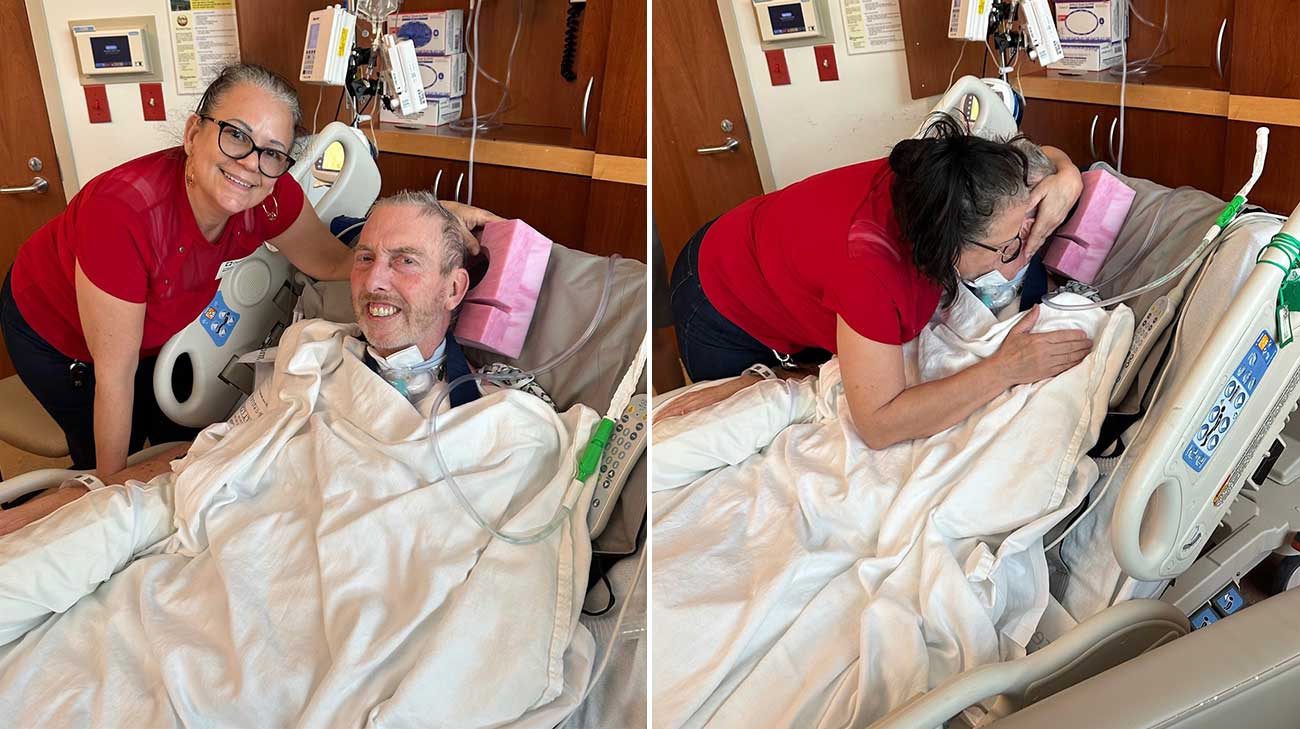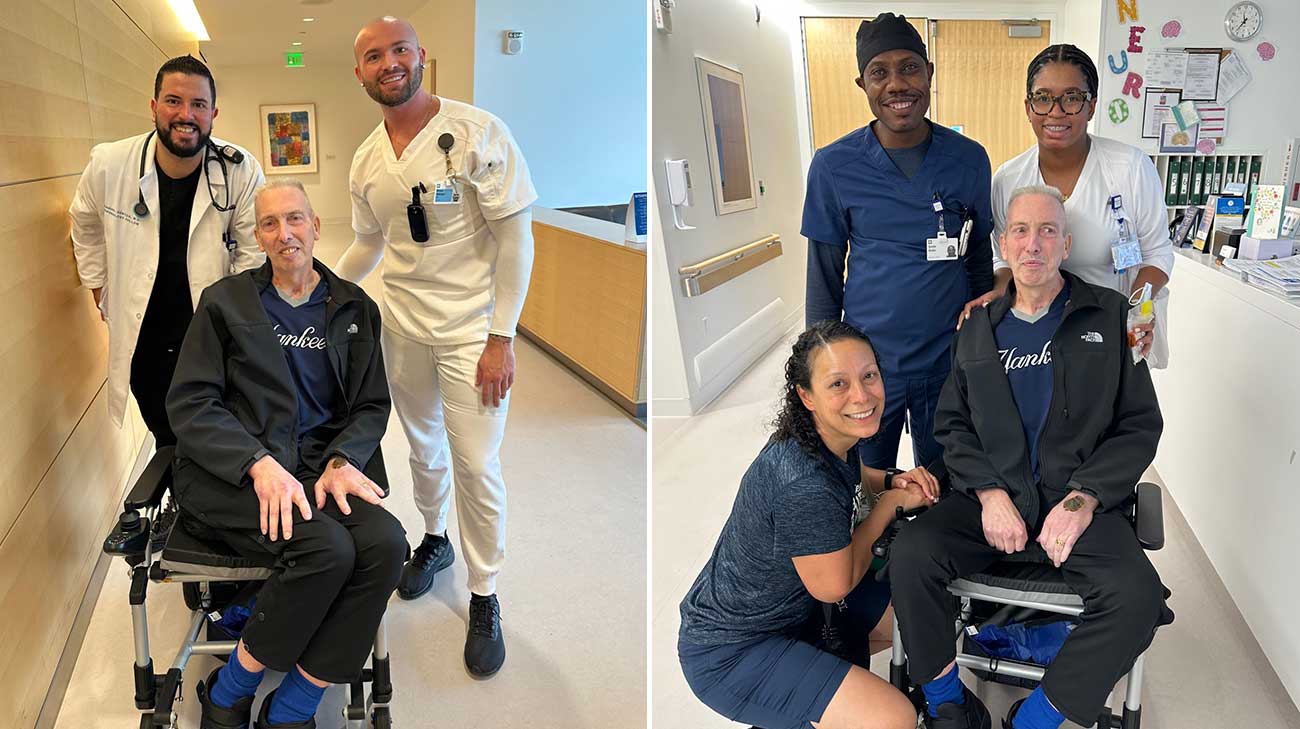Michael Ryan, a 55-year-old retired New York City police lieutenant had been enjoying life in Weston, Florida, since he moved there in 2018 with his wife, Rosa, a retired New York City police sergeant. The couple stayed busy working at the Fort Lauderdale Police Department and Broward College Law Enforcement Academy, respectively. They enjoyed spending time with their family, which includes two grown children, volunteering in the community and staying physically active.
An avid runner who had trained in martial arts since he was 16 years old, Michael seemed to be in great health. So, it was quite a shock when, during a routine therapeutic massage, he had a sudden heart attack that nearly cost him his life.
“I was on the massage table and my body locked up and I started to convulse,” Michael says of that day in May of 2023. Fortunately for him Lissette Martinez, a retired emergency room and trauma nurse, was getting a facial in the room next door. When she heard the cries for help from Michael’s masseuse, she rushed over and performed CPR on him for about six minutes until the paramedics arrived.
Michael was taken to Cleveland Clinic Weston Hospital where Kenneth Fromkin, MD, an interventional cardiologist, performed an emergency procedure to open the blocked arteries that had caused the heart attack.
Nina Thakkar Rivera, DO, PhD, a cardiologist who specializes in advanced heart failure and transplant cardiology, was called in to see Michael after the procedure and found that was “declining very rapidly.” She activated the shock team calling in Nicolas Brozzi, MD, a cardiothoracic heart transplant surgeon at Weston Hospital.
“As a consequence of his heart attack, Michael had gone into a rare cardiogenic shock,” Dr. Brozzi says. “That’s when the circulation is very slow in your body and the organs start shutting down. Michael was in an extreme condition.”
About 10 percent of patients who have heart attacks progress to cardiogenic shock, Dr. Brozzi says. And the chance of surviving that is less than 10 percent.

Michael with Lissette, whose quick actions saved his life. (Courtesy: Michael Ryan)
Michael was placed on an ECMO (extracorporeal membrane oxygenation) machine, a simple form of the heart-lung machine used in open-heart surgery that oxygenates the blood and keeps it flowing through the body. By performing these essential functions for the body, it provides time for the patient to recover heart function or, in some cases, await a heart transplant.
This machine was vital, as not only had Michael had a critical heart attack resulting in sudden cardiac arrest, but also he developed cardiogenic shock from stress-induced cardiomyopathy known as Takotsubo, in which his heart lost all ability to pump for itself. “This machine meant the difference between life and death for Michael,” Dr. Brozzi says.
After four days, Michael’s heart was strong enough for him to be weaned off the ECMO machine. Unfortunately, though, his kidneys also were affected. Michael had suffered acute kidney injury, which is common after cardiogenic shock. His kidneys essentially shut down, requiring him to be placed on continuous dialysis.
“Initially, we didn’t think Michael would make it out of the hospital based on his presentation and how sick he was,” says Hany Anton, MD, a nephrologist at Weston Hospital. “It is very remarkable how he pulled through all of this.”
Michael remained in the hospital until July 31, when he was well enough to be discharged to a rehabilitation facility. He eventually returned home in mid-September – four months after his heart attack.

Despite given a 10% chance to make it through, Michael, with the help of his care team, defied the odds. (Courtesy: Michael Ryan)
His last day of dialysis was October 27 and, despite some complications with his toes from the lack of circulation, Michael is recovering well and looking forward to possibly going back to work in a couple of months.
“Life took a hard turn on me fast,” Michael says. He credits his recovery to the strong support and prayers he received from his family, friends and community, as well as the expert multidisciplinary care he received at Cleveland Clinic. But, he says, one of the key factors in his survival was the lifesaving CPR he received from Lissette, the nurse in the massage room that day, who made sure to visit Michael at the hospital during his recovery – a very emotional first time meeting.
This was crucial because for every one-minute delay in bystander CPR, survival decreases by 10%. “I don’t think I would be here without her,” he says. He is making it his personal mission to encourage people to get trained in CPR.
Dr. Anton, who calls Michael “The Miracle Man,” says he believes what helped Michael was the good physical condition he was in prior to his heart attack and the presence of his family and friends throughout his time in the hospital.
“Michael had the odds stacked against him,” Dr. Anton says. “It is a miraculous recovery.”
Related Institutes: Heart, Vascular & Thoracic Institute (Miller Family)

